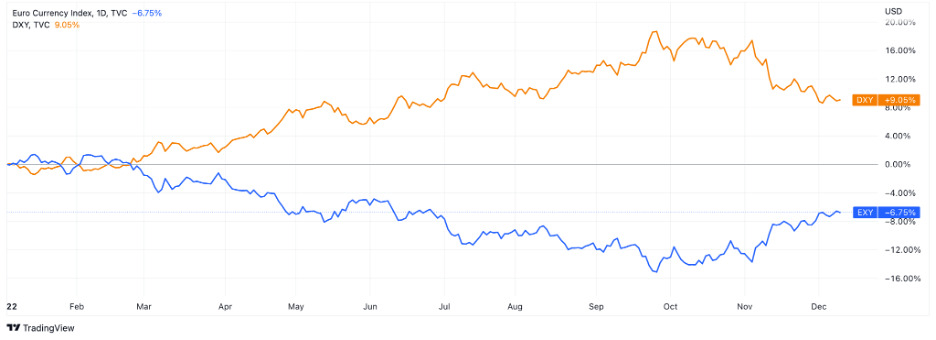The Federal Reserve has been one of the markets’ most influential stars in 2022. Every rumor about possible key rate changes has affected prices. And aggressive interest rate hikes led to an extraordinarily strong USD. Will this trend continue in 2023, and what will the result be? Let’s explore this using the EUR/USD pair – the instrument nobody in their right mind should ignore.
In 2022, the euro is worth less than the US dollar – it is the worst performance for the EU currency seen in the last 20 years. Okay, okay, we’re pretty sure you remember that. But it was actually quite complicated – to put it more precisely, there were two trends happening simultaneously. If you want to predict trends yourself, you can use the economic calendar – it includes all major economic events and might help you predict the movements of the markets.
Now – the chart. It shows the trends we’re talking about. The Dollar index, measuring the USD value relative to a basket of foreign currencies – and as we can see, DXY has been increasing this year. At the same time, EXY – the euro against four major currencies – has been decreasing.
They are like twins, actually. Like yin and yang – when one increases, the other decreases. Or, if you squint, you might be able to see a picture of the Rorschach test here.

We can see strong – and obvious – dependencies between the dollar and the euro. But the main idea here is not in the inversely proportional patterns. The important thing is that the results of this year are not about an increase in USD to EUR or EUR to USD. The US dollar has been hiking against all major currencies, while the euro has been dropping.
The EUR is under pressure in 2022. The war in Ukraine, the subsequent energy crisis, rising prices and a decreasing number of job opportunities. All these problems are links of the same chain, and it’s hard to say when that chain will be broken.
At the same time, the crisis is being seen all over the world (not only in Europe). In such conditions, the US dollar becomes a safe haven. Stocks are dropping, inflation is beating bond rates, other currencies aren’t inspiring confidence – so you save your money and diversify your portfolio by buying USD. It’s a global factor that is unlikely to change in the near future.
But the quarterback in this game is the Fed. These 3 letters can change everything. Most of the large movements you can see on the chart were caused by key rate changes or rumors about them. At the end of 2022, the euro got closer to the US dollar because the market expected the Fed to stop hiking rates so hawkishly.
For now, the rate is 4%. And the main question is whether the Fed will increase the interest rate or not. Most analysts consider the Federal Reserve likely to do that, but not by too much. The average forecast for the United States interest rate in the next year is about 5%.
What will happen in reality? It’s very difficult to tell. One possible scenario is an increase in USD in the first half of 2023, followed by the growth of interest rates. And the opposite situation in the second half of the year – the Fed will stop its policy and the euro will have a chance to rise.
In addition, several more factors are able to influence the EUR/USD pair. While the military conflict between Russia and Ukraine rages on, it’s difficult to imagine – but economic growth in Europe and improvements in the energy crisis might support the euro too. Actually, in the short term, even the weather can change the relation of the euro to the US dollar. For example, a warm winter would reduce European dependence on energy carriers' prices (for a while at least).
As it stands, however, all eyes are on the Fed. If you can ride the waves of the Federal Reserve’s movements, you’ll probably do quite well in the currency market. Or at the very least – you’ll stay afloat while others sink.
Original Source of the original story >> The Fed vs. The World






